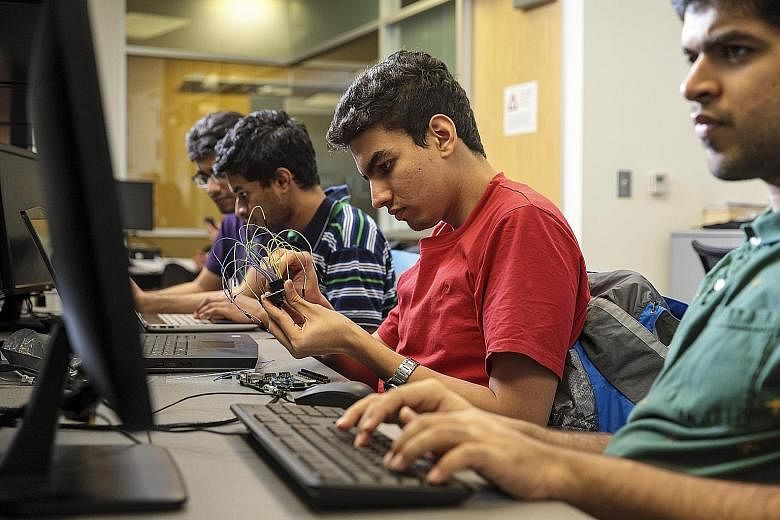NEW YORK • The president of Portland State University, Dr Wim Wiewel, met 10 prospective students in Hyderabad, India, last week.
But what started as a get-acquainted visit quickly turned into more of a counselling session, as the students expressed fears about coming to the United States this autumn.
One student, who is Muslim, said his father was worried that the US had an anti-Muslim attitude, Dr Wiewel recounted. "Several others said they were concerned about the 'Trump effect'," he said in an e-mail.
"I'd say the rhetoric and actual executive orders are definitely having a chilling effect," Dr Wiewel wrote, referring to the Trump administration's travel ban.
Like many universities across the country, the Oregon university is getting fewer international applications.
Nearly 40 per cent of colleges are reporting overall declines in applications from international students, according to a survey of 250 colleges and universities, released this week by the American Association of Collegiate Registrars and Admissions Officers.
The biggest decline is in applications from the Middle East.
-
40%
Percentage of colleges reporting overall declines in applications from international students.
Many officials cited worries among prospective students about Trump administration immigration policies.
"International student recruitment professionals report a great deal of concern from students all over the globe," the study said.
On Wednesday, the federal judge in Hawaii who blocked the latest version of the administration's travel ban cited the financial harm the executive order posed to the state's university system, which recruits students and hires faculty members from the six target countries.
Graduate schools appear to be feeling the worst pinch, with nearly half reporting drops.
"Our deans describe it as a chilling effect," said Dr Suzanne Ortega, president of the Council of Graduate Schools.
The numbers - while not yet final - are provoking anxiety in some programmes that rely on international students, who bring more than US$32 billion (S$45 billion) a year into the US economy.
International enrolment at US colleges has been on the rise during the past decade, and for the first time exceeded one million students last year.
Still, despite the steady increase, the movement of students from one country to another is sensitive to fluctuations tied to political and economic forces.
So some officials cautioned that a "Trump effect" is just one possible explanation for this year's application figures. Beyond that, many schools, including New York University, the University of Southern California and Northeastern University, reported that their international numbers are up.
Purdue University reported a 1.2 per cent decline in graduate school applications.
Dr Wiewel made his trip to Hyderabad not long after residents of the city held funeral services for a young Indian man who was killed in a bar in Olathe, Kansas, where he worked as an engineer.
The shooting is being investigated as a hate crime.
Slumping graduate school applications can be seen at universities ranging from giant Big 10 public universities like Ohio State and Indiana University to regional programmes such as Portland State, a school of just over 27,000 students, including more than 1,900 international students.
At Portland State, where undergraduate international applications are up 4 per cent but international graduate applications are down 15 per cent, the school's vice-provost for international affairs, Dr Margaret Everett, said she had heard recently from a Chinese student who cancelled his application, citing the political climate.
"Obviously we're concerned about the climate and the rhetoric and the administration policies and travel ban," she said.
NYTIMES

